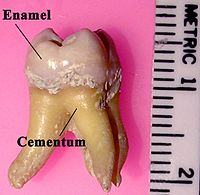
Photo from wikipedia
Ocean acidification can cause dissolution of calcium carbonate minerals in biological structures of many marine organisms, which can be exacerbated by warming. However, it is still unclear whether this also… Click to show full abstract
Ocean acidification can cause dissolution of calcium carbonate minerals in biological structures of many marine organisms, which can be exacerbated by warming. However, it is still unclear whether this also affects organisms that have body parts made of calcium phosphate minerals (e.g. shark teeth), which may also be impacted by the ‘corrosive’ effect of acidified seawater. Thus, we examined the effect of ocean acidification and warming on the mechanical properties of shark teeth (Port Jackson shark, Heterodontus portusjacksoni), and assessed whether their mineralogical properties can be modified in response to predicted near‐future seawater pH (–0.3 units) and temperature (+3°C) changes. We found that warming resulted in the production of more brittle teeth (higher elastic modulus and lower mechanical resilience) that were more vulnerable to physical damage. Yet, when combined with ocean acidification, the durability of teeth increased (i.e. less prone to physical damage due to the production of more elastic teeth) so that they did not differ from those raised under ambient conditions. The teeth were chiefly made of fluorapatite (Ca5(PO4)3F), with increased fluoride content under ocean acidification that was associated with increased crystallinity. The increased precipitation of this highly insoluble mineral under ocean acidification suggests that the sharks could modulate and enhance biomineralization to produce teeth which are more resistant to corrosion. This adaptive mineralogical adjustment could allow some shark species to maintain durability and functionality of their teeth, which underpins a fundamental component of predation and sustenance of the trophic dynamics of future oceans.
Journal Title: Global Change Biology
Year Published: 2022
Link to full text (if available)
Share on Social Media: Sign Up to like & get
recommendations!